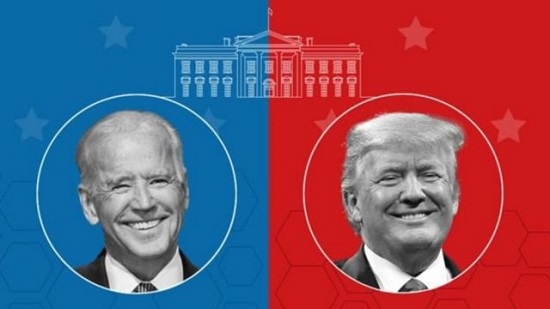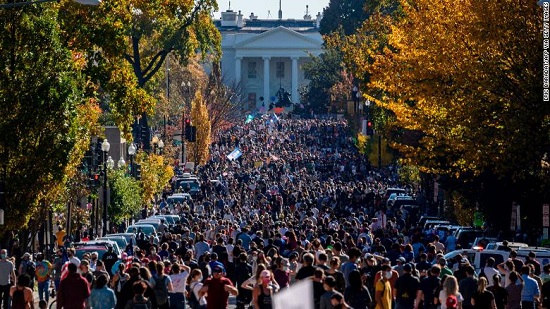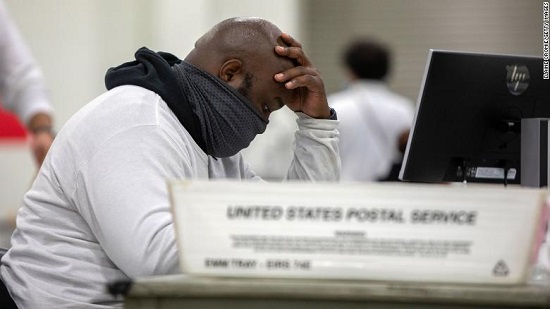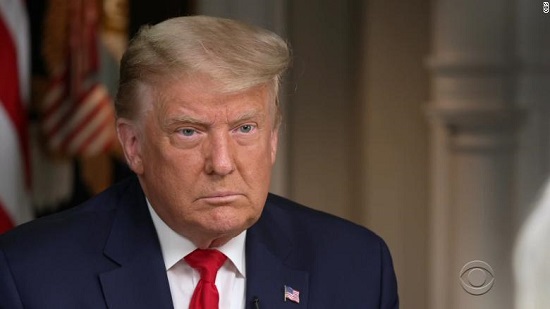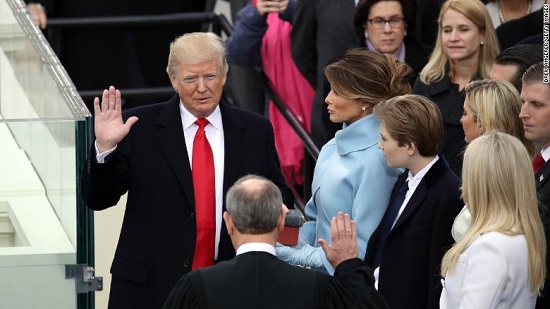America delivers its verdict on Donald Trump
America delivered its verdict on Donald Trump last week, and it was devastating for him.
He became one of the select few incumbent Presidents to lose his bid for a second four years in office, the first since President George H.W. Bush was defeated by Bill Clinton in 1992. But Trump was not swept from office in an anti-Republican rout -- his party did exceptionally well in other races across the United States. His defeat was a clear statement that the nation, speaking through voters in states controlling a majority of electoral college votes, finally had enough of Trump himself.
"Donald Trump defeated Donald Trump," wrote David Axelrod. "Trump s political demise wasn t caused by the coronavirus but by the underlying and familiar deficiencies of character and leadership of America s first reality show president."
Yes, Trump s polarizing approach to politics was rewarded with record support from GOP voters, but, Axelrod added, "for the president who placed his bet on the politics of division and practiced it with a relentless ferocity, the math just didn t add up. He not only inflamed his own base but a larger coalition of Americans, determined to end his stormy, divisive rule."
The winner, Joseph Robinette Biden, Jr., campaigned as the opposite of Trump, a uniter who would seek common ground with Republicans. "Character proved to be the clearest contrast with the incumbent president he dislodged with a decisive defeat," John Avlon wrote. "Now his success will be our country s success, and by leading with character he might help our nation rediscover the central importance of character, not only within the presidency, but within ourselves."
By his side will be Kamala Harris: the first woman, and the first woman of color, to be vice president. Arick Wierson wrote, in a letter to his 4-year-old daughter, that "Today, millions of young girls like you across this great land will go to bed knowing that this country has a place for you, no matter where you want to go in life." He added, "That a woman of color will soon be first in line to the presidency won t mean that people won t put up obstacles in front of you based on your sex or race as you go through life. But Harris broke new ground today."
A brazen attack on democracy
Donald Trump has governed as no other American President has. And in defeat, he continued to break virtually every norm. With no evidence, he charged in a speech from the White House Thursday evening that the election was a fraud and that Democrats were stealing it from him. Republicans launched a volley of lawsuits that appeared to have virtually no chance of overturning the election result.
"At its core, the President s speech was an attack on our democracy and the legal voting systems long established in every one of our states and territories," wrote Anne Milgram. "The President screaming that the polls and voting were fraudulent -- without any evidence of fraud -- was the political equivalent of someone falsely screaming Fire! in a crowded movie theater. The goal was to create confusion and undercut the outcome of the election."
The vote counting made it clear that Trump has lost, wrote Joshua A. Douglas.
"It is now time for leading Republicans, such as Sens. Mitch McConnell and Lindsey Graham, as well as former President George W. Bush, to speak up. They must demand that Trump cease his dangerous language that casts doubt on the legitimacy of the election and -- unless he has real evidence -- end his baseless lawsuits that seek only to further undermine people s faith in the outcome."
Trump was on the golf course when CNN and other networks called the election Saturday, and there was no immediate way to tell how he reacted. But Michael D Antonio pointed out, "The one certain fact about Trump in his moment of defeat in his race against former Vice President Joe Biden is that he is not feeling good at all. Presidents are rarely denied when they pursue a second term -- it has happened four times in the last 100 years -- which means Trump cannot escape the label he hates most of all: loser. Losers are, in Trump s view, undeserving of respect, admiration, and affection."
Candidates who lose presidential elections routinely concede, noted Julian Zelizer. Trump chose not to, and he vowed to continue challenging the results. "The good thing is that it doesn t ultimately matter," wrote Zelizer. "A formal concession after an election is not embedded in our Constitution -- it is a norm." Biden will become the 46th President on January 20 whether or not Trump concedes.
Trump will then be an uneasy new member of the normally convivial club of former Presidents, wrote Kate Andersen Brower. In 1980, today s senior living former President, Jimmy Carter was soundly defeated by Ronald Reagan. He took it hard, Brower wrote.
Ultimately, "Carter, like Gerald Ford before him and George H.W. Bush after him, accepted the humiliating loss. We suspected that Donald Trump would not be so graceful about accepting defeat. But he is turning out to be the first president who will be dragged kicking and screaming into the Presidents Club."
If those county names now mean something to you, you may have spent long hours last week watching CNN s John King at the Magic Wall, zooming in and out on the geographic boundaries of America s 3,000-plus counties to make sense of the election results.
It wasn t exactly the outcome most people expected, based on pre-election polls: These, on average, correctly gave Biden the edge over Trump, but they also predicted he would lead a wave of Democrats into office with him. Democrats actually lost seats in the House and thus far have failed to flip enough Senate seats to guarantee a majority.
When the counting is over, Donald Trump will wind up with far more votes than any Republican presidential candidate ever, and more than he received in 2016. That is a bitter pill for his critics who had hoped for repudiation, as Frida Ghitis wrote, of his pattern of exploiting "racism and xenophobia, one of the ugliest aspects of his presidency and his campaign. But the millions who voted for Trump were not all gullible or racist."
"Tens of millions of Americans have seen and heard something else from Trump that appeals to them...The issues on which he promises to fight for the people are worth noting. Ignore for a moment what he has done, and listen to what he has promised, what he said that resonated with voters -- except for the racist parts," Ghitis observed.
"Democrats and many in the media assumed, wrongly, that a message of Orange Man Bad would result in a landslide," wrote Republican Doug Heye. "All they had to do was repeat anti-Trump rhetoric over and over -- and surely voters would agree. But issues matter. Talk from Democrats of packing the court, the Green New Deal, various proposals on universal health care, not to mention violence surrounding protests, likely scared people who voted for Trump in 2016, in part because they didn t like Hillary Clinton, to vote for him again in 2020."
Progressives "wanted a moral victory," Van Jones wrote. "We wanted an overwhelming repudiation of horrific policies -- like separating migrant children from their parents at the border -- and hurtful rhetoric. We did not get that." Still, Jones found reasons for hope, most notably the Biden victory.
"It s easier to be a parent this morning," he wrote after the race was called. "It s easier to be a dad. It s easier to tell your kids that character matters. The truth matters. Being a good person matters. Joe Biden will be our next president and Donald Trump will not."
Why did the vote counting stretch for so long after Election Day? Officials in many states were overwhelmed by the flood of mailed-in ballots from voters wary of in-person voting, due to the Covid-19 pandemic. Some states started the counting of these votes before Election Day, but legislators in Pennsylvania couldn t reach agreement on a bill to do so.
Trump had railed against the use of mail-in ballots, and as Paul Begala noted, observers believed that "the GOP legislators were more interested in pleasing Trump than in helping their fellow citizens count the votes efficiently."
Pennsylvania Attorney General Josh Shapiro argued for patience as the count continued. "Voters can have confidence that if they followed the law, their vote will be counted -- and no matter who wins, that the final vote count will be legitimate. This is a commitment made in every state, in every county, in every city and town across America: in states that lean Democrat and in states that lean Republican, on the West Coast and the East Coast, from Hawaii to the heartland. That s our American tradition, and that is our law."
Covid-19: now what?
The day before the election, Elizabeth Yuko marked the seven-month anniversary of her long-term case of Covid-19. "As I watched the election results trickle in Tuesday night and the counting continue through the week," she wrote, "it became evident that no matter who wins, public health has suffered a major loss. The close race indicates that a substantial number of voters opted to support someone whose dangerous messaging on Covid-19 will only make the pandemic worse -- never mind making any progress in slowing its spread."
With the presidential race dominating the news, many people may have missed the sharp rise in the spread of infections. On Friday, the US set an alarming record of more than 125,000 new reported infections in a single day.
It came a few days after Trump accused doctors of exaggerating the number of Covid-19 cases so they could make more money. That shocked Dr. Janice Blanchard, a professor in George Washington University s emergency medicine department. "Back in March, Trump compared doctors to warriors fighting a medical war," Blanchard pointed out. "Now, just like the insults he previously hurled upon those who died on battlefields, labeling them as losers and suckers, he is disparaging those of us who risk our lives in the fight against Covid-19."
On Friday, Bloomberg News reported that White House chief of staff Mark Meadows, who had said, "we are not going to control the pandemic," had contracted the virus himself.
Sometimes an actor wears a role so compellingly that he is forever associated with it in the public s memory: such was the case with Sean Connery, the film world s first James Bond, whose death at the age of 90 was announced on October 31. From the time he appeared in "Dr. No" in 1962, he embodied the spirit of the British secret agent with a license to kill.
"Connery s do-it-all-and-do-it-often work ethic was obscured by the James Bond image, which helps explain why he was so desperate to get out from under one of the most spectacularly successful tentpoles in movie history," wrote Gene Seymour. "He was the first Bond and, to this day, the most definitive because he carried the cruel mouth and short, black hair that Ian Fleming used as physical descriptions of his British secret service agent years before the film adaptations."
"After leaving the Aston Martin in the garage for Moore and others," Seymour added, "Connery s stature kept growing as did the nature of his roles, whether as a swashbuckling Moroccan insurrectionist in 1975 s The Wind and the Lion, or as a gracefully aging Robin Hood in 1976 s Robin and Marian. He could also dial down his own magnetism to great effect as in 1990 s The Russia House, an adaptation of John le Carre s novel about a semi-retired publisher reluctantly pressed into undercover duty in the Glasnost-era Soviet Union."
When Seymour saw Connery s character in that film "fumbling desperately with a spy gadget," he was tempted to "cry to the screen, Oh, come on! You know how to use that! "










